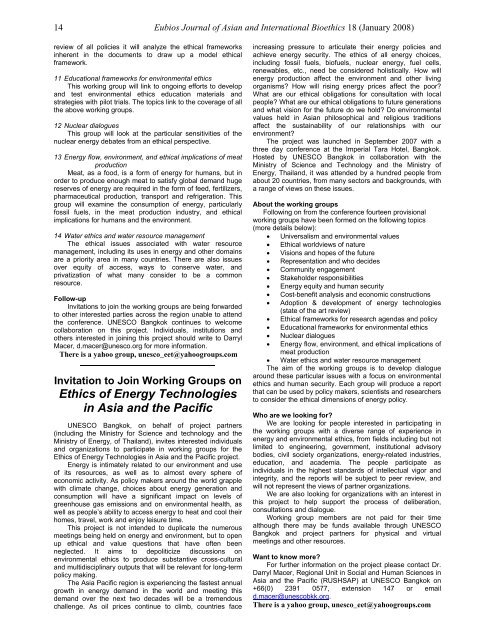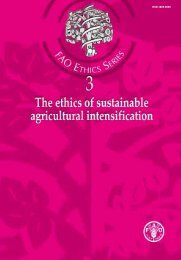14<strong>Eubios</strong> <strong>Journal</strong> <strong>of</strong> <strong>Asian</strong> <strong>and</strong> <strong>International</strong> <strong>Bioethics</strong> 18 (January 2008)review <strong>of</strong> all policies it will analyze the ethical frameworksinherent in the documents to draw up a model ethicalframework.11 Educational frameworks for environmental ethicsThis working group will link to ongoing efforts to develop<strong>and</strong> test environmental ethics education materials <strong>and</strong>strategies with pilot trials. The topics link to the coverage <strong>of</strong> allthe above working groups.12 Nuclear dialoguesThis group will look at the particular sensitivities <strong>of</strong> thenuclear energy debates from an ethical perspective.13 Energy flow, environment, <strong>and</strong> ethical implications <strong>of</strong> meatproductionMeat, as a food, is a form <strong>of</strong> energy for humans, but inorder to produce enough meat to satisfy global dem<strong>and</strong> hugereserves <strong>of</strong> energy are required in the form <strong>of</strong> feed, fertilizers,pharmaceutical production, transport <strong>and</strong> refrigeration. Thisgroup will examine the consumption <strong>of</strong> energy, particularlyfossil fuels, in the meat production industry, <strong>and</strong> ethicalimplications for humans <strong>and</strong> the environment.14 Water ethics <strong>and</strong> water resource managementThe ethical issues associated with water resourcemanagement, including its uses in energy <strong>and</strong> other domainsare a priority area in many countries. There are also issuesover equity <strong>of</strong> access, ways to conserve water, <strong>and</strong>privatization <strong>of</strong> what many consider to be a commonresource.Follow-upInvitations to join the working groups are being forwardedto other interested parties across the region unable to attendthe conference. UNESCO Bangkok continues to welcomecollaboration on this project. Individuals, institutions <strong>and</strong>others interested in joining this project should write to DarrylMacer, d.macer@unesco.org for more information.There is a yahoo group, unesco_eet@yahoogroups.comInvitation to Join Working Groups onEthics <strong>of</strong> Energy Technologiesin Asia <strong>and</strong> the PacificUNESCO Bangkok, on behalf <strong>of</strong> project partners(including the Ministry for Science <strong>and</strong> technology <strong>and</strong> theMinistry <strong>of</strong> Energy, <strong>of</strong> Thail<strong>and</strong>), invites interested individuals<strong>and</strong> organizations to participate in working groups for theEthics <strong>of</strong> Energy Technologies in Asia <strong>and</strong> the Pacific project.Energy is intimately related to our environment <strong>and</strong> use<strong>of</strong> its resources, as well as to almost every sphere <strong>of</strong>economic activity. As policy makers around the world grapplewith climate change, choices about energy generation <strong>and</strong>consumption will have a significant impact on levels <strong>of</strong>greenhouse gas emissions <strong>and</strong> on environmental health, aswell as people’s ability to access energy to heat <strong>and</strong> cool theirhomes, travel, work <strong>and</strong> enjoy leisure time.This project is not intended to duplicate the numerousmeetings being held on energy <strong>and</strong> environment, but to openup ethical <strong>and</strong> value questions that have <strong>of</strong>ten beenneglected. It aims to depoliticize discussions onenvironmental ethics to produce substantive cross-cultural<strong>and</strong> multidisciplinary outputs that will be relevant for long-termpolicy making.The Asia Pacific region is experiencing the fastest annualgrowth in energy dem<strong>and</strong> in the world <strong>and</strong> meeting thisdem<strong>and</strong> over the next two decades will be a tremendouschallenge. As oil prices continue to climb, countries faceincreasing pressure to articulate their energy policies <strong>and</strong>achieve energy security. The ethics <strong>of</strong> all energy choices,including fossil fuels, bi<strong>of</strong>uels, nuclear energy, fuel cells,renewables, etc., need be considered holistically. How willenergy production affect the environment <strong>and</strong> other livingorganisms? How will rising energy prices affect the poor?What are our ethical obligations for consultation with localpeople? What are our ethical obligations to future generations<strong>and</strong> what vision for the future do we hold? Do environmentalvalues held in <strong>Asian</strong> philosophical <strong>and</strong> religious traditionsaffect the sustainability <strong>of</strong> our relationships with ourenvironment?The project was launched in September 2007 with athree day conference at the Imperial Tara Hotel, Bangkok.Hosted by UNESCO Bangkok in collaboration with theMinistry <strong>of</strong> Science <strong>and</strong> Technology <strong>and</strong> the Ministry <strong>of</strong>Energy, Thail<strong>and</strong>, it was attended by a hundred people fromabout 20 countries, from many sectors <strong>and</strong> backgrounds, witha range <strong>of</strong> views on these issues.About the working groupsFollowing on from the conference fourteen provisionalworking groups have been formed on the following topics(more details below):• Universalism <strong>and</strong> environmental values• Ethical worldviews <strong>of</strong> nature• Visions <strong>and</strong> hopes <strong>of</strong> the future• Representation <strong>and</strong> who decides• Community engagement• Stakeholder responsibilities• Energy equity <strong>and</strong> human security• Cost-benefit analysis <strong>and</strong> economic constructions• Adoption & development <strong>of</strong> energy technologies(state <strong>of</strong> the art review)• Ethical frameworks for research agendas <strong>and</strong> policy• Educational frameworks for environmental ethics• Nuclear dialogues• Energy flow, environment, <strong>and</strong> ethical implications <strong>of</strong>meat production• Water ethics <strong>and</strong> water resource managementThe aim <strong>of</strong> the working groups is to develop dialoguearound these particular issues with a focus on environmentalethics <strong>and</strong> human security. Each group will produce a reportthat can be used by policy makers, scientists <strong>and</strong> researchersto consider the ethical dimensions <strong>of</strong> energy policy.Who are we looking for?We are looking for people interested in participating inthe working groups with a diverse range <strong>of</strong> experience inenergy <strong>and</strong> environmental ethics, from fields including but notlimited to engineering, government, institutional advisorybodies, civil society organizations, energy-related industries,education, <strong>and</strong> academia. The people participate asindividuals in the highest st<strong>and</strong>ards <strong>of</strong> intellectual vigor <strong>and</strong>integrity, <strong>and</strong> the reports will be subject to peer review, <strong>and</strong>will not represent the views <strong>of</strong> partner organizations.We are also looking for organizations with an interest inthis project to help support the process <strong>of</strong> deliberation,consultations <strong>and</strong> dialogue.Working group members are not paid for their timealthough there may be funds available through UNESCOBangkok <strong>and</strong> project partners for physical <strong>and</strong> virtualmeetings <strong>and</strong> other resources.Want to know more?For further information on the project please contact Dr.Darryl Macer, Regional Unit in Social <strong>and</strong> Human Sciences inAsia <strong>and</strong> the Pacific (RUSHSAP) at UNESCO Bangkok on+66(0) 2391 0577, extension 147 or emaild.macer@unescobkk.org.There is a yahoo group, unesco_eet@yahoogroups.com
<strong>Eubios</strong> <strong>Journal</strong> <strong>of</strong> <strong>Asian</strong> <strong>and</strong> <strong>International</strong> <strong>Bioethics</strong> 18 (January 2008) 15Evolutionary Thinking,Global Warming, <strong>and</strong>Environmental Ethics- Arthur SaniotisDiscipline <strong>of</strong> Anthropology, School <strong>of</strong> Social SciencesThe University <strong>of</strong> Adelaide, Australia (2 Morgan Street, WestHindmarsh, Adelaide, South Australia, 5007, Australia)E-mail: saniotis@yahoo.co.ukIntroductionGlobal warming will prove to be the most significantphenomenon which will inform the planet’s evolution in theforthcoming centuries. Not since the mass extinctions at theend <strong>of</strong> the Cretaceous period has the earth witnessed such athreat to biodiversity (Laszlo 1994:xiii). Ervin Laszlo calls thepresent period a grave threat to the biosphere by a terrestrialspecies. While the critical output <strong>of</strong> scientific analyses onglobal warming has only recently been acknowledged bysocial power brokers, there has been no “sustainableframework for the management <strong>of</strong> global warming” (Held2005:96). This is concerning due to the natural developmentswhich are currently taking place such as widespread droughtsin Australia, recent heat waves in Northern Europe, meltingice caps in the North <strong>and</strong> South Poles, <strong>and</strong> diminishingglaciers in Africa, North India, <strong>and</strong> Northern Europe. Thesheer volume <strong>of</strong> scientific studies done on climate changemakes it untenable to suggest that the earth is not undergoingglobal warming. The information confirms otherwise. Thequestion which now faces humanity is whether the kind <strong>of</strong>intelligence that it had evolved for is sufficient to guide it intothe future (Laszlo 1994:97). This is both an ethical <strong>and</strong> anecessary question due to humanity’s rapacious treatment <strong>of</strong>the planet. While human cognition has been an evolutionaryhallmark, its continuous failure to live synergistically withecology is perhaps due to the biological default <strong>of</strong> Homosapiens (Ehrlich 2000). Whether humans lack the basicbehavioural skills to exist in a non-parasitic manner withnature is a point in question. The social collapses <strong>of</strong> theEaster Isl<strong>and</strong> people, the Maya, <strong>and</strong> the Mohanjo Daro in theIndus valley point to widespread ecological degradation.Moreover, millennia <strong>of</strong> fire burning <strong>of</strong> the Australian habitat<strong>and</strong> the probable extinction <strong>of</strong> ancient mega fauna byAboriginal Australians effaced the l<strong>and</strong>scape. For thebiologist Paul Ehrlich, human beings seemingly have apenchant for degrading the environment which otherwiseopposes the plethora <strong>of</strong> ecological worldviews.Anthropogenic climate change is a continuation <strong>of</strong> Homosapiens’ ill legacy. This paper will outline a need forevolutionary thinking in response to global warming <strong>and</strong> itsethical issues. I will argue that global warming is anincreasing ethical issue which dem<strong>and</strong>s a new way <strong>of</strong>underst<strong>and</strong>ing earth’s ecology <strong>and</strong> humanity’s place in itsscheme.Changing Paradigms: Evolutionary ThinkingFor Bateson (2000, 2002), Laszlo (1996), <strong>and</strong> Capra(2002), human beings have been informed by negativecognitive maps (mental representations) in relation to theenvironment. Bateson refers to negative cognitive maps as“internal incoherence” (2000:173), a process which obviatesfrom internal critique <strong>and</strong> “external reality” (2000:208). Theprocess <strong>of</strong> critical awareness is a creative exercise or anevolutionary way <strong>of</strong> learning as it foregrounds co-operation<strong>and</strong> networking (Montuori 1993).Here Maslow <strong>and</strong> Honingmann’s analysis <strong>of</strong> societies isinstructive. Both authors categorise societies into dominator<strong>and</strong> gylanic societies. Dominator societies have low synergybetween individuals, exploit nature, encourage competition,<strong>and</strong> are not mutually reinforcing. The oeuvre <strong>of</strong> dominatorsocieties is cognate with Jung’s description <strong>of</strong> the “OdinArchetype” − the image <strong>of</strong> cruelty, conquest (Laszlo et al1996:52). Moreover, learning patterns in dominator societiessustain practices for the generation <strong>of</strong> conflict, therebymitigating conflict resolution strategies (Montuori 1993). Inthis way, learning patterns amplify negative feedback loopsthereby repeating non-corrective mechanisms (Montuori1993). Gylanic societies have high synergy betweenindividuals, view nature as organismic, <strong>and</strong> have mutuallyreinforcing behaviours (Maslow <strong>and</strong> Honingmann 1970:324).This categorical schema corresponds with Gert H<strong>of</strong>stede’shigh/low masculine cultures (H<strong>of</strong>stede 2001). High masculinecultures such as the United States, Japan, China, UnitedKingdom, Australia, <strong>and</strong> Canada are characterized bymaterial <strong>and</strong> value achievement, control, <strong>and</strong> social power(Dysart-Gale 2006). Low masculine cultures found inSc<strong>and</strong>inavian countries are typified by co-operation, lessemphasis on gender roles, <strong>and</strong> importance <strong>of</strong> inter-personalrelationships (Dysart-Gale 2006).Laszlo et al’s (1996) analysis <strong>of</strong> cognitive maps furtherlocate internal incoherence to the mitigation <strong>of</strong> internal moralstructures. Their tri-partite model categorises three kinds <strong>of</strong>moral maps; pre-conventional morality, conventional morality,<strong>and</strong> post-conventional morality. The pre-conventional moralstage is characterized by a self serving attitude; the individualis ruled by the dictum, “If it feels good, do it.” In theconventional moral stage individuals comply with groupethical st<strong>and</strong>ards <strong>and</strong> recognize the moral authority <strong>of</strong> law<strong>and</strong> dogma. The top end <strong>of</strong> this stage is typified by a“legalistic orientation” where individuals may challenge groupauthority via engaging in “citizenly activities” (Laszlo et al1996:46). At the post-conventional moral stage individualsare deeply morally conscious, encourage universalism, <strong>and</strong>advocate critical learning skills which are <strong>of</strong>ten at odds withother social members (Laszlo 1996:47). The degree <strong>of</strong>divergence between the three cognitive moral maps reflectsthe inability <strong>of</strong> individuals to work in partnership to solveglobal problems. For this reason Laszlo et al advocate for thedevelopment <strong>of</strong> new societal <strong>and</strong> individual cognitive maps fortackling pan-human issues such as global warming(1996:105). A fundamental shift is needed based on learningfrom nature, <strong>and</strong> not dominating nature (Benyus 1997:2).In relation to global warming Laszlo (1994) Laszlo et al(1996), <strong>and</strong> Capra (2002) support the emergence <strong>of</strong>ecoliteracy <strong>and</strong> sustainability. Capra notes that the changingperceptions <strong>of</strong> sustainability are a significant ethicaldevelopment (2002:229). Ecoliteracy entails:1. Underst<strong>and</strong>ing principles <strong>of</strong> nature’s organisationalprinciples. In systems theory ecosystems are viewed asbeing autopoiec (self creating), inter-related, <strong>and</strong> withincreasing complexity. Eco-systems are based on cooperation,co-evolution, <strong>and</strong> networking. As Capra (2002:232)points out, nascent life on earth originated by networking notcombating.2. Ecosystems have evolved to sustain life <strong>and</strong>possess multiple feedback loops in a dynamic balance.The process <strong>of</strong> ecoliteracy would entail the application <strong>of</strong>nature’s organisational principles for the development <strong>of</strong> newsocietal <strong>and</strong> individual cognitive maps, <strong>and</strong> applying these inthe creation <strong>of</strong> new, sustainable technologies <strong>and</strong> socioeconomicsystems. Thus, human purposes would work interdependentlywith natural systems. Laszlo et al suggest threeareas in which ecoliteracy can be developed which comprisesocial <strong>and</strong> ethical dimensions.1. Male/Female RelationshipsProblems such as global warming will necessitate thepartnership <strong>of</strong> men <strong>and</strong> women in all social domains. This will
















